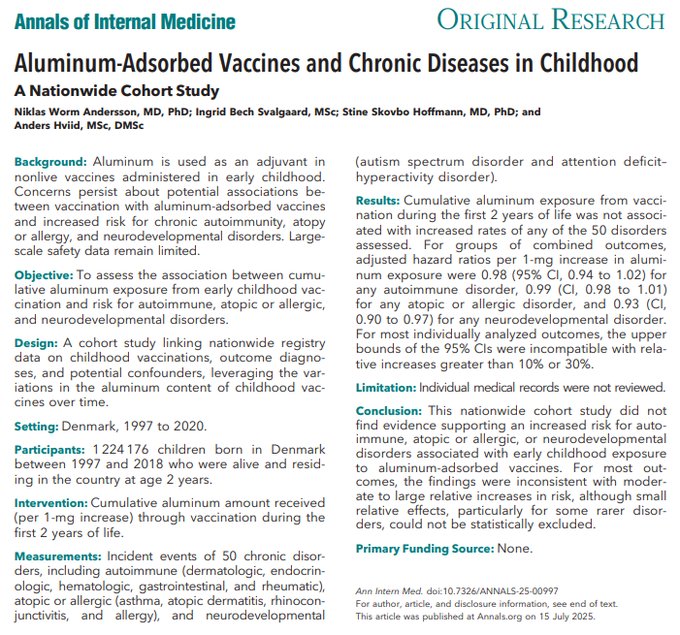Explaining the Danish Study on Aluminum in Vaccines
___
RFK Jr. is misrepresenting a landmark Danish study that followed 1.2 million children over 24 years. The study found no link between aluminum in vaccines and autism or neurodevelopmental harm. Let’s fact-check his claims – using actual data.
This study represents gold-standard epidemiological research. Over 24 years, researchers tracked 1.2 million children across 50 health outcomes. Edward Belongia, leading vaccine safety expert: “the largest and most definitive observational study on the safety of vaccine-related aluminum exposure in children” ever conducted.
Here’s the study: https://pubmed.ncbi.nlm.nih.gov/40658954/
RFK Jr. claims the study was “designed not to find harm.” That’s wrong. Different birth cohorts received different aluminum doses due to national policy changes – not parental choice. This “natural experiment” minimizes confounding and bias. It’s a strength, not a flaw.
He also cites “67% increased Asperger’s risk” from supplementary data. The actual study shows Asperger’s HR 1.13 (0.89-1.44), which is not statistically significant and nowhere near 67%. In extended follow-up: HR 1.02 (0.93-1.12).
The “67%” figure is from one tiny subgroup in the supplementary data (Supplement Figure 4), just 51 Asperger cases from one birth cohort (2007-2018).
This is textbook cherry-picking, and here’s why it’s misleading: The finding is barely significant with a confidence interval of 1.01-2.77. That wide range means the true effect could be anywhere from a 1% increase to nearly tripling the risk, massive uncertainty from small numbers.
The earlier birth cohort (1997-2006) with 124 cases, 2.5 times more data and longer follow-up, shows HR 0.99 (0.76-1.29), completely non-significant. If aluminum caused Asperger’s, we’d see consistent effects across cohorts.
Most damning: the exact same data shows autism spectrum disorder HR 0.91 (0.87-0.96) and autistic disorder HR 0.92 (0.86-0.98), statistically significant protective effects with thousands more cases. If I cherry-picked like this, I could claim “aluminum prevents autism!” But that would be equally dishonest. This is why you don’t mine subgroup analyses. When you run hundreds of comparisons, some will hit significance by chance. The overall pattern shows no evidence aluminum in vaccines causes autism or neurodevelopmental harm.
He calls exclusions “deceptive,” but they’re standard epidemiology. Excluding children who died before age 2 or had serious pre-existing illness avoids confounding. Excluding “implausible” vaccine doses is routine data cleaning – flagging registry errors, not hiding evidence.
The aluminum safety record is robust: WHO’s Global Advisory Committee found “no evidence of health risk in >60 years of use” across >1 billion doses. This conclusion isn’t based on one study, it’s consistent across decades of research.
The Danish study specifically found no increased asthma risk with aluminum exposure (HR 0.96, CI 0.94-0.98). While a 2023 U.S. study suggested a small potential association, its authors stressed it was observational, couldn’t prove causation, and benefits vastly outweigh any unproven risks.
RFK Jr. calls it “absurd” that higher aluminum exposure was linked with lower disease risk in some outcomes. But that’s a known phenomenon: residual confounding in observational studies. It doesn’t mean aluminum is protective – just that real-world data is complex.
He accuses the researchers of corruption. In fact:
-
- The study was not funded by industry
- Statens Serum Institut is a public health institute – not a pharma company
- Data sharing limits stem from Danish privacy law
This is not a cover-up. It’s standard scientific protocol.
RFK Jr. misrepresents routine methods as “deception” and levels baseless accusations of fraud. That’s not scientific critique. It’s misinformation. Parents deserve facts, not fear.
P.S. I understand why people ask about unvaccinated controls – it seems logical on the surface.
But here’s why the Danish study’s design is actually more scientifically robust: The study did include 15,237 children who received no aluminum-containing vaccines by age 2. To test whether including this small unvaccinated group affected their results, researchers ran a separate analysis that excluded these children entirely – looking only at vaccinated children with varying aluminum exposures. The findings were unchanged, confirming that the presence of unvaccinated children didn’t bias the results.
But comparing vaccinated vs unvaccinated creates major problems: Unvaccinated families differ systematically from vaccinated ones in healthcare-seeking behavior, socioeconomic factors, lifestyle choices, and attitudes toward medical intervention. These differences make it nearly impossible to tell if any health differences are due to vaccines or these other factors.
There’s also an ethical issue: researchers can’t randomly assign children to remain unvaccinated when vaccines are the standard of care and prevent serious diseases. That would be like withholding known effective treatments.
Denmark’s study is actually more sophisticated: over 24 years, Denmark’s national vaccine program naturally evolved – they introduced new vaccines, switched suppliers, and updated formulations for routine public health reasons. This created different aluminum exposure levels across birth cohorts without any intentional experimentation. This ‘natural experiment’ lets researchers compare low vs medium vs high aluminum exposure within a vaccinated population – avoiding the confounding problems of vaccinated vs unvaccinated comparisons. This dose-response approach across 1.2 million children with careful statistical controls is robust epidemiological methodology.
________
Dr. Jake Scott is an infectious disease specialist who sees patients in clinic at Stanford Health Care. He is also a clinical associate professor of medicine at Stanford. This post was originally published as a thread on X by Dr. Scott, in response to claims made about this 2025 study. It is republished here with permission.
